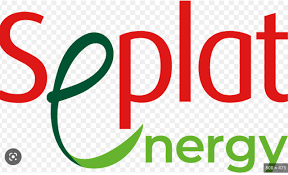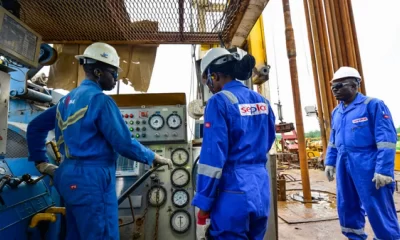OPINION
REVISITING SEPLAT, AFTER SIX YEARS

By Okey Ikechukwu –
History was made, nearly a decade ago, in the oil and gas and financial services industries, with the simultaneous listing of the ordinary shares of Seplat Petroleum Development Company Plc on the main market of the London Stock Exchange (“LSE”) (LSE:SEPL) and the Nigerian Stock Exchange (“NSE”) (NSE:SEPL).
Back in 2014 when this page said that Seplat “enjoys the rare distinction of being the first Nigerian company operating strictly in the upstream oil and gas sector to be simultaneously listed on the London Stock Exchange (LSE), as well as the Nigerian Stock Exchange (NSE),” the celebratory write-up, “Dangote, Seplat and Who Next?” was urging Nigerian big firms to follow bold examples and register viable presence in the global economic space. Seplat’s move was then described as: “…suggestive of not just credibility but pedigree and strategic positioning for global relevance. No company becomes a player in the global business environment because the government likes or dislikes it. It is an inclement environment, where no one gets piggy backed across tough terrains. If anything, those who make it unto the platform must break out of the protection and restricting paradigms of particularistic national economies… the core focus of the strategic footwork is to expand the economic space and create opportunities (not charities) for a mix of competent players.”
One major feature of the global economic space is that it tolerates only serious economic actors and commercial interests with good governance templates. It is for players with proven capacities for creating, drawing and redrawing new boundary lines in product and service quality, as well as service delivery. Seplat’s continued relevance (especially with its 2020 balance sheet) is defined by measurable contributions and verifiable impact. The news is that the company has always had a sound corporate governance framework, as well as an organizational culture that rests squarely on a board of directors and management team with very commendable records. This, perhaps, explains its many successes under the rigorous scrutiny of the UK’s Financial Conduct Authority (FCA). Notwithstanding this fact, the firm was recently in the news over some alleged debt with a related company. The curious thing in the, perhaps contrived, media controversy is that a man who is not owing a company in which he has equity, who received no dividends, who took no pay or loans from the company, who is not part of the board and management and who even lost money in the venture is being arm-twisted to take responsibility for what falls outside his plate. A quoted public liability company is always guided by laws regarding its dealings and relationships with its subsidiaries. The very definition, and treatment, of debt is part of the deal and the courts are looking into the matter.
But Seplat is not new to controversy at all. Relatively early in the life of the company, it was wrongly mentioned in a media report about irregularities in the granting of Pioneer Status Incentive to “undeserving companies by NIPC between 2010 and 2014, leading to a revenue loss of $20 billion.” The authorities looked into the matter and quickly came out with a Statement of Exoneration for Seplat jointly signed by the Nigerian Export Promotion Council (NIPC), the Federal Inland Revenue Service (FIRS), the Ministry of Trade and Industry (MITI), and the Revenue Mobilisation and Fiscal Commission (RMAFC). The processes leading up to the granting of Pioneer Status Incentive to over 400 Nigerian companies, including Seplat, was thereby diligently explained and clarified. The government further showed that the “publication did not distinguish between pioneer status from other forms of fiscal incentives” and that the Pioneer Status Incentives granted to Marginal Oil Field Operators/Nigerians owned oil companies is in line with the Local Content policy of the government to promote Nigerian Content Development, local capacity and capabilities. It noted, further, that there was no loss of $20 billion, describing the figure as unrealistic, purely speculative and lacking in any material basis whatsoever, given the existing financials at the time. The joint statement wondered and noted as follows: “The motive behind the publication is difficult to understand, yet it remains very disturbing when one considers its negative impact on the reputation and integrity of the highly reputable Nigerian company, Messrs Seplat Petroleum Development Company Plc that had attained the enviable status of being listed and successfully trading in the Nigerian and London Stock Exchanges”
For the record, the Approval from the NIPC, regarding the Pioneer Status incentive, was found to have been duly and properly conveyed to Seplat, indicating Corporate Tax Holiday on eligible product/service, for five years. This was also found to have been duly followed by a letter from the FIRS and the Ministry of Trade and Industry conveying same. The application was made in 2013, while the Pioneer Status was granted in February 2014, with the FIRS in tow. Seplat’s credibility has since made substantial mileage from the fact that the savings the company has from tax incentive has been utilized in driving dramatic increase in gas supply to the domestic market, as over $300 million in gas development occurred within the tax holiday period granted by the federal government. The company also recorded substantial increase in oil production, from 14,000 barrels in 2010 to 70,000 in 2015 alone. Add the foregoing to the conspicuous upward movement of Royalty payments from $40 million in 2010, to $145 million in 2014, as well as continued funding of the NPDC/Sepalt JV, despite huge outstanding cash calls. There are also records of job creation and community development, with over 300 new jobs. The multiplier effects of Seplat’s over $700 million which has gone into the system through Nigerian contractors brought in another 1000 jobs. This boils down to aggressive reinvestment of proceeds, significant increase in oil and gas production and the tripling of Royalty and tax payments, as well as, post Pioneer Status.
The company’s 2020 full year financial results show that, notwithstanding the fact that the year was a challenging one, Seplat demonstrated resilience, creative management and an admirable ability to break new grounds, against all odds. Its ability to perform well and deliver relatively above par on production, in line with guidance and despite operating with minimal incidences of COVID-19 cases, say a lot. It is a matter of record that the company invested in Asa North and Ohaji (ANOH) and voluntarily paid down $100 million of debt from the $330 million of cash generated from operations. Seplat’s current sheets shows an increase in capital investment, despite facing the lowest oil prices in its 10-year history. It has not yet failed to honour its commitment to shareholders, ensuring a regular income stream on their investment and maintaining shareholder trust and loyalty.
Among other things, the company has final dividend of $0.05 per share recommended ($0.10/share for full year), operating profit of $121 million (before non-cash impairments and unrealized fair value losses), a strong cash position of $259 million after $100 million RCF repayment, among other positives. The other positives include liquids production of 33,714 bopd, gas production of 101 MMscfd Low unit cost of production at $8.90/boe, with cost-cutting initiatives ongoing, particularly at OML40/Ubima. Seplat has drilled/completed nine wells and brought eight onstream in 2020. There is also the creation of New Energy unit to manage gas processing and future low carbon to zero carbon initiatives, as well as the AGPC financing signed in February 2021, $260 million raised, with commitments for $450 million. Furthermore, the Board Directive to eliminate Related-Party Transactions by end of 2021 holds the prospect of a rebirth of sorts. The company is now looking at a full-year production guidance of 48-55 kboepd, subject to market conditions; with a focus on gas projects and an exploration well to meet reserves replacement targets.
The company knows that gas is the lower-carbon feedstock for affordable electricity, especially with Nigeria’s galloping demographics. Seplat is quietly leading the country away from huge expenditures on imported, expensive, high-emission diesel-generated energy. Its desire to present the necessary baseload for a functioning electricity grid that will promote and project renewable energy, the way it exists in more technologically advanced nations, is a project on its own. The ultimate goal is to create a balance between environmental sustainability and the social agenda of a growing modern state; as Nigeria transits in its energy needs and use. The flagship ANOH project is now fully funded. Seplat has made visible giant strides in these trying times. Major gas processing units are expected to arrive in the third quarter of this year and installation is to commence before the end of the year. The mechanical completion and pre-commissioning is expected to take place in the first quarter of 2022, with the first gas flow to customers is expected to commence within the year.
All said, and after nearly seven years of full operations here and beyond our shores, Seplat Petroleum Development Company Plc has given a good account of itself, by providing shared values to the industry, the nations and to its stakeholders. As for questionable controversies, they usually collapse when confronted by the truth.
FEATURES
Victor Okoli: The Young Nigerian Tech Founder Building Digital Bridge Between Africa and America

Victor Chukwunonso Okoli, founder of Vnox Technology Inc. (USA) and Vnox Limited (Nigeria), is steadily emerging as one of the most promising new voices in global travel-tech. His mission is clear: bridge the technological gap between Africa and the United States, redefine global travel systems, and empower a new generation of skilled youths through innovation-driven opportunities.
In a statement issued in Onitsha, Anambra State, by Vnox Limited (Nigeria), the company emphasized Okoli’s growing influence as a Nigerian international graduate student contributing meaningfully to U.
S. innovation. His rising travel-technology platform, FlyVnox, currently valued at an estimated $1.7 million, is positioning itself as a competitive player in the global travel ecosystem.Okoli explained that Vnox Technology was founded to “train, empower more youths, create global employment opportunities, and drive business growth through our coming B2B portal inside the FlyVnox app.” The platform’s new B2B system aims to support travel agencies, entrepreneurs, and businesses across Africa and the diaspora—giving them access to modern tools, previously inaccessible technologies, and global opportunities.
Several young men and women are already employed under the expanding Vnox group, with more expected to join as the brand grows internationally.
Born and raised in Eastern Nigeria, Okoli’s early life exposed him to the realities and frustrations faced by international travelers and diaspora communities. After moving to the United States for graduate studies, he transformed those experiences into a bold technological vision—building systems that connect continents and create seamless mobility for users worldwide.
At the center of that vision is the FlyVnox app, a modern airline-ticketing platform built with global users in mind. Combining American engineering precision with African mobility realities, FlyVnox offers international flight search, multi-currency support, secure payments, transparent pricing, and a clean, intuitive interface.
Beyond FlyVnox, Okoli has built a growing tech ecosystem under Vnox Technology Inc., which oversees several innovative ventures, including: Vnox TravelTech Solutions LLC (FlyVnox App), VnoxPay (fintech), VnoxShop / Zyrlia (e-commerce)
VnoxID / Nexora (digital identity and smart business card solutions)
Vnox Limited (Nigeria) anchors African operations, media services, and talent development—ensuring the brand remains rooted in its home continent even as it grows globally.
Okoli’s work has broad significance for both Africa and the United States. He represents the powerful impact of immigrant entrepreneurship on global competitiveness—creating new jobs, driving innovation, strengthening U.S.–Africa commercial ties, and contributing to the development of practical, scalable technologies.
The statement concludes that Vnox Technology is a brand to watch. As FlyVnox gains international traction and the Vnox group expands its footprint, Victor Okoli stands as a symbol of a rising generation: African-born, globally minded, and building technologies that connect and serve the world.
OPINION
Insecurity in Nigeria: Any Remedy?

By Sunday Ayami
Nigeria, Africa’s most populous nation and largest economy, in Africa continues to face complex security challenges. These issues threaten national stability, economic growth, and the wellbeing of its citizens. The security landscape is shaped by a combination of terrorism, banditry, separatist agitations, communal conflicts, and organized crime.
The Boko Haram insurgency, active since 2009, remains a significant threat, mainly in Borno, Yobe, and Adamawa states.
Although the group has suffered territorial losses, its splinter faction, the Islamic State West Africa Province (ISWAP), remains potent. Frequent attacks target both civilians and security personnel. The humanitarian crisis continues, with millions displaced and persistent food insecurity.Armed bandit groups operate extensively in Zamfara, Kaduna, Katsina, Niger, and Sokoto states. These groups engage in mass abductions, cattle rustling, and extortion. Kidnappings for ransom have become commonplace, affecting schoolchildren, commuters, and even local officials. The government has launched multiple military operations, but violence persists.
Competition over land and water resources between sedentary farmers and nomadic herders has intensified, especially in Benue, Plateau, and Nasarawa states. These clashes often escalate along ethnic and religious lines, resulting in hundreds of deaths and displacement.
Although major militant activities in the Niger Delta have subsided since the 2016/17 resurgence, oil theft, pipeline vandalism, and environmental degradation continue to undermine the economy and fuel local grievances.
The Indigenous People of Biafra (IPOB) continue to agitate for independence, often clashing with security forces. Their armed wing, the Eastern Security Network (ESN), has been implicated in attacks on government facilities and security checkpoints. The region continues to experience periodic unrest and enforced sit-at-home orders.
Urban centers grapple with armed robbery, cult violence, and organized crimes, while piracy and maritime crime remain concerns in the Gulf of Guinea, threatening maritime trade.
The Nigerian government has adopted a multi-pronged approach to tackle security issues, including: Multiple campaigns such as “Operation Hadin Kai” in the Northeast and “Operation Whirl Punch” in the North-central target insurgent and criminal groups. Attempts at police reform and increased funding for security agencies have been implemented with mixed results.Efforts to negotiate with some groups or offer amnesty, particularly in the Niger Delta. Partner within ECOWAS and with Western countries enhance intelligence sharing and maritime security operations.
Despite these efforts, challenges remain: underfunding, corruption, interagency rivalry, inadequate equipment, and low public trust hamper effectiveness.
Over 3 million internally displaced persons (IDP).
OPINION
When Does a Nation Die?

By Chidi Amuta
Recent trends in our national life have forced Nigerians to abandon the virtue of incurable optimism and unconditional hope in the nation as a perpetual reality. It used to be that in all circumstances, Nigerians would never believe that the nation is under any terminal threat.
But in recent times, the percentage of Nigerians awaiting the imminent collapse of the nation has now far outnumbered the minority still hoping that the country will survive its present travails. It seems that we are fast approaching that slippery joint where it is hard to find any believers in the survival and meaning of Nigeria. Instead, throughout the length and breadth of this vast land, a new and unhappy consensus has emerged: Nigeria is dying!The usual refrain of “God is in control” or “This, too, shall pass” in difficult times has given way to a silent indignation and resignation.
A silent poor woman who used to be a trader in trivia at the roadside has nothing left to sell and no money to buy what she needs. She raises her open palms skywards in speechless supplication as tears stream down her cheeks. She has become for me an embodiment of the tragedy of the times in which we now live.By a curious irony with a tinge of tragicomedy, the Tinubu government is trumpeting ‘hope’ as its most important offering. The regime has adopted what it calls “the Renewed Hope Agenda” as its mantra and unique caption of the -mandate of this presidency. In a note of tragic irony bordering on self -deprecation and mockery, each appearance of the President at a public forum (including gatherings of judges!), a new regime anthem titled “On Your Mandate, We shall stand” has become informally mandatory. It sometimes precedes the old resurrected National Anthem. It sounds more like a comic choir rented to laugh at a nation in the throes of death.
Suddenly, we seem to have arrived at this unhappy consensus: Nigeria is dying! This existential admission of the imminent death of our nation is the unfolding legacy of our endangered democracy. Our elections lack credibility or popular following. In recent elections in Ondo, Edo and Anambra states, the consistent average voter turnout has been below 35%. People register to vote but find nothing worth voting for. They are taking stock of previous years of this ritual of voting and find nothing cheery. They just stay home instead of being counted as part of the statistics of deceit and betrayal.
As it turns out, the greater percentage of this miserable recent turnout are even transactional votes. On the election days, partisan buyers and sellers of votes mount point of sale checkpoints at most polling booths. Your voters’ card entitles you to a miserable cash handout: N2000-N5000. T could be higher depending on the cash power of the contestants. The votes that show up at INEC’s voter machines represent the balance sheet of total sales and purchases made at all the polling stations at the election.
Other aspects of our democracy are equally in disarray. The party system is shattered. The ruling party has become a power monopoly intent on swallowing other parties. The major opposition party, the PDP, has a resident destabilizer with a single mandate: to kill the party and ensure that it is its carcass that walks into the next general election. The rest of the opposition platform has been frightened into disarray by sundry agents of the state and party in power. The various alliances and rumours of alliances are merely scare crows manipulated by agents of the ruling party.
In itself, the ruling party is saddled with hand -picked officials who make no distinction between the party as an institution of democracy and the government in power or indeed between the political party and the state. A democracy in which there is no distinction between the party in power and the party in government leads to a degrading usurpation of the state by the political elite of the ruling party. A factional elite cannot govern a state without wholly appropriating the machinery of the state to its individual and collective advantage. State capture is complete when the leading lights of the ruling hegemonic party become also the leading lights of the nation. The likes of Wike, Umahi and Akpabio become the faces of the nation. These constantly nattering Nabobs of current power negativity have been elevated to the status of arbiters of values for the nation. They brandish their wealth and false identities to frighten ordinary citizens.
In itself, the business of governance under Mr. Tinubu has become a humdrum ritual of boring reflexes. Great national happenings are marked by high school grade routine statements from the pinnacle of power. No actions are initiated. Once a presidential pronouncement is signed off, the leadership moves on to await the next tragic checkpoint. The life of the nation progresses from one tragedy as preparation for the next. No action plan follows the train of tragedies and failures. Just move on in the hope that tomorrow will be a better day, without bad news and disheartening occurrences. But bad news has become our new normal.
Whatever happens to the nation, one sector never sleeps. Politics of anyhow and anything remains in business. Politicians keep decamping from other parties or no parties to the ruling party in droves. No need to state why people are decamping. The parties they are coming from or the one they are migrating to stand for nothing. No ideology. No core beliefs. Nothing. And in any case, there are no consequences for changing parties like filthy underpants. So the beat goes on: breakfast in Labour Party. Lunch in PDP. Dinner in APC. Even those in the ruling party either as cabinet members or legislators do nothing in particular to justify their large charges on the public treasury. In return for doing practically nothing, a bunch of jobless politicians earn an entitlement to costly SUVs, free housing, large entourages of domestic and official minions and vast troves of cash in all currencies as kickbacks and contractors’ gift packs. There is delight in chasing off road users with limitless motorcades of official nonentities escorted by authorized state hooligans in uniform.
While politicians luxuriate in plenty, the daily life of our citizenry is mirred in want and penury. Recent policy measures have further eroded the living standards of the ordinary Nigerian. An endless litany of taxes, levies and tolls has rendered every item of living cost unaffordable. Prices of everything ranging from gasoline to cooking gas, school fees to transport fares, basic medication to hospital bills and building materials have shot through the roof. Even if these were elements of economic management, nothing has been put in place to indicate that the state has a compassionate aspect. Instead, there is an unhidden hand of cruelty in new policies. A few days ago, the government expressed an intention to impose a 15% surcharge on the already astronomical prices of gasoline. Only the fear of mass protests as in Kenya, Tanzania and Algeria frightened the government into pulling back on this tax on an existing tax regime on gasoline!
While the public keeps expecting the government of the day to alleviate mass suffering, the very essence of our national existence is eroded by the day. The most elementary obligation of the state, the protection of life and property, is everywhere in peril. People are now dying daily on an industrial scale. Terrorists, jihadists, bandits, gangsters, casual criminals compete with each other as to how many they kill, abduct, dispossess or cause to disappear.
Those paid by the state to protect the rest of us look on in indifference or manifest the most embarrassing incompetence in the discharge of the duties. At best, none performing or delinquent security officials are fired in droves with no explanations to the public. The other day, the DSS sacked over 100 officers with no public explanation. These hounds have been unleashed into the amorphous public space to heighten an insecurity that has defied decades of tepid government effort. These are officers who are trained in weapon handling and other skills that they will easily deploy to increase our insecurity.
A state that cannot guarantee basic security of life and limbs of citizens has of course failed to protect and guarantee its territorial integrity. Nigerians no longer know where Nigeria stops and bandit territory begins. Every other forest, savannah stretch and unoccupied building in Nigeria is now an ungoverned space literally owned and inhabited by non- state actors. The possession of arms and weapons of war used to be the exclusive preserve of the state. Guns and uniforms used to frighten ordinary people off government. Not anymore. Now, the most sophisticated weapons of war are in the hands of terrorists, bandits and sundry criminals. The most garish uniforms are now worn by non-state organized squads. Jihadists in rags now outgun our best kitted military units. Literally, the Nigerian state has been outgunned by the forces of those that do not wish us well and the government of the day looks on in sheepish incompetence. In some states, elected governors’ stage ‘peace’ meetings with bandit leaders and their armed cohorts while the police and military provide “security” in full view of television cameras. So, whose nation is this anyway?
Only recently, a symbolic drama was staged on the streets of Abuja. In a motor park -like encounter, FCT minister, Nyesom Wike was engaged by a mid -level Naval officer in an encounter over landed property. Instructively, the military high command sided unanimously with the naval officer. In this symbolic scuffle between the military and political wings of the ruling elite, the military asserted itself stiffly as a contender in the game of political supremacy. In an atmosphere where a rumoured coup is being investigated, wise politicians have since sided with the military in this land grab encounter. Wike, a noisy political jackal with scant common sense has been stripped naked and left sulking alone.
The justice system is not left out of the hopelessness. Even in cases where the law is challenged to defend and protect the rights of individuals or track and punish violators of the law, the Nigerian judiciary has been consistently wanting. Judges deliver judgments to fit their bills. Material appeasement of the highest echelons of the judiciary in the form of cash, automobiles, free houses and unaccounted vacations have blurred the boundaries between justice and injustice. The rights of citizens now have a price tag.
The agencies of public accountability only exist to hound those whom the state does not like. The police arrests and detains those it adjudges state adversaries while authorized criminals roam and wax freely. Public protest against misrule and injustice is rewarded with tear gas and bullets and prolonged incarceration without charges or trial. A nation in which the Accountant General can steal most of the funds in the treasury without setting off any audit alarm is at best a rogues’ piggy bank guarded by squads of pick pockets.
Our general perception in the world outside our borders has tumbled to an all-time low. From being the voice of African strength, we have degenerated to a sorry state. Our foreign policy exertions have sunk to a diplomacy of the beggarly. Imagine the recent Threat by Donald Trump in the days of Murtala Mohammed and Obasanjo either as military leader or elected president.
Against the foregoing backdrop, citizen loyalty and confidence in the state has dropped to near zero. The common man in the streets who used to be proud of his nation in spite of its faults has withdrawn to his or her tent. People are more concerned about surviving to the next day than bother about the niceties of national survival and community. At best, people are now cursing and abusing Nigeria. Many now wish they were never born here. Our passport and identity have become badges of shame abroad. Most significantly, a nation that used to believe that God will ultimately rescue the nation has lost that last anchor of hope in divine provenance and providence. Citizens have begun to doubt the efficacy of divine solution that will save the nation as it is today.
While a general disillusionment has eroded hope and confidence in the nation, the government of the day cannot find the courage to compare itself to any of its predecessors. But governments do not exist in isolation. They derive their credibility from fitting themselves into a historical spectrum provided by their predecessors.
It is not for us to pronounce judgment on the Tinubu government in terms of its record of performance. From the return of democracy in 1999 to the present, citizens can now pick and choose when they last had a good meal, affordable life or peace of mind from insecurity. We miss Obasanjo’s banking reforms and liberalization of the stock market. We miss his initiative in opening up the telecommunications market. We miss the introduction of debit and credit cards and cashless platforms in the economy. We miss the Jonathan era before he found himself in the midst of Boko Haram. Looking back now, who will not prefer the Naira at 175 to the dollar and multiple access to credit for consumption and business? Or a bag of cement at a little over N2,000? Even Buhari’s N400-N500 to the dollar cannot be compared to today’s hellish N1,500 to the dollar. Or gasoline at N185 a liter compared to today’s N1,000 average for a liter at the pump.
Obasanjo was feared as a strong willed warrior, respected as a nationalist elder statesman and accepted by all as a detribalized national leader. Yar’dua was admired as a man of Spartan discipline and honest patriotism. Jonathan never pretended to be what he is not. He said he would not make too many promises for fear of failing to deliver on any. Buhari was a patent ethnicist, religious fanatic and unrepentant autocrat but he would rather borrow to keep his rusty government going than impose further suffering on the ordinary people.
Against the record of his predecessors since 1999, Tinubu will bear the burden of self -assessment at the end of his remaining two years. Put simply, Tinubu will judge Tinubu. Whether his eventual assessment will be confirmed or repudiated by the electoral outcome of the 2027 election is a puzzle that Nigerian democracy will have to unravel in the years ahead.
The questions are simple: Will Nigerians renew the mandate of a leader who is subjecting them to such harrowing hardship? Will the majority of Nigerians vote again for a party that has been responsible for such ruinous misrule of the nation for over a decade?





























